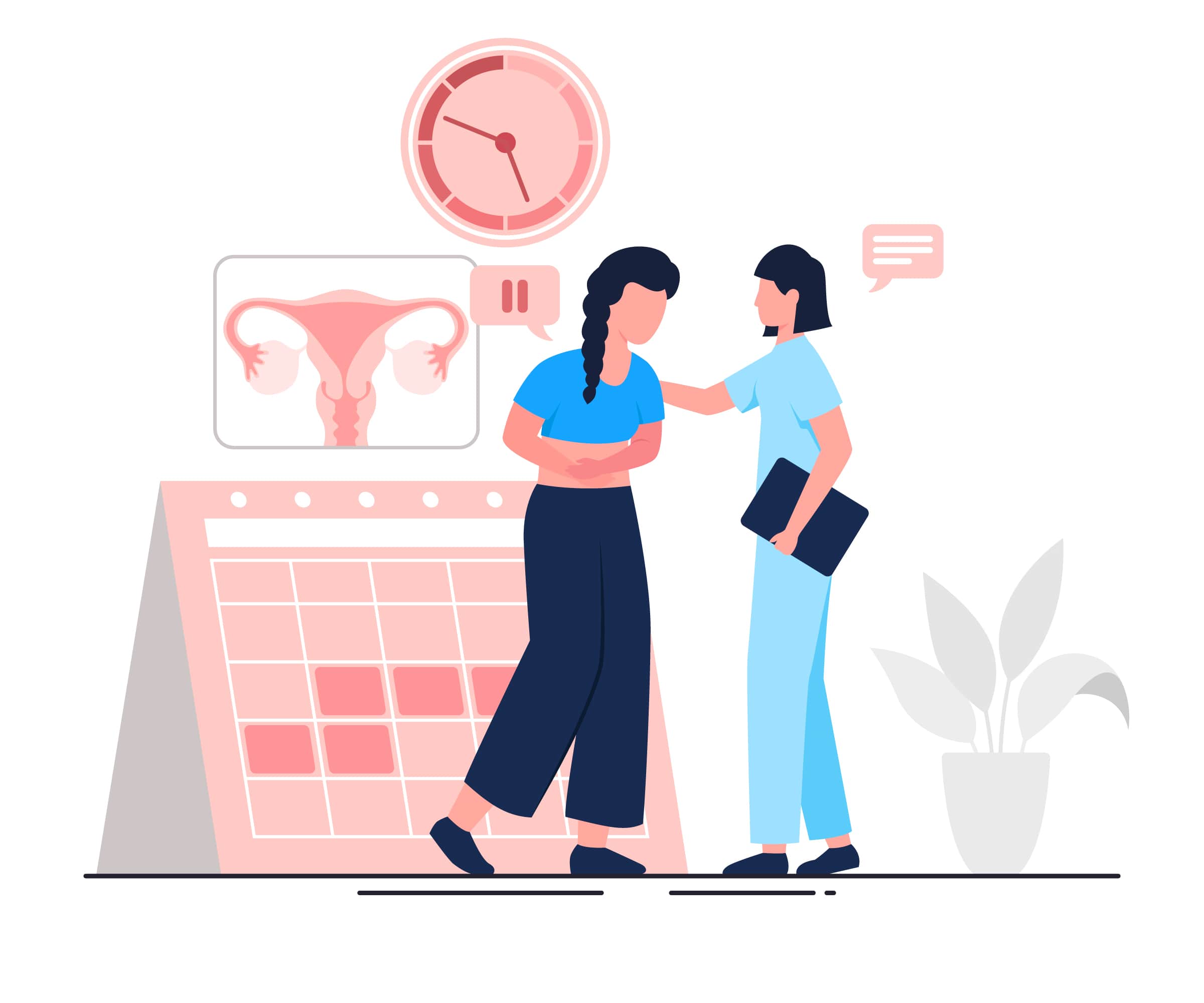Call Us
Everything you need to know about PCOS (Polycystic Ovarian Syndrome)

What you can expect from this blog
This blog gives you a thorough understanding of what Polycystic Ovarian Syndrome is, its causes, and examples. With this, we aim to spread awareness of PCOS and the importance of health and nutrition when diagnosed with the condition.
You will also find us debunking myths and stating the facts and statistics that would eventually help you understand the gravity of PCOS.
This blog acts as a complete guide to PCOS. So if you are someone with PCOS or know someone who has PCOS, you must give it a read.
Introduction

Missed your period? Excessive body hair? Sudden unexplained weight gain? Mood swings? Emerging acne? Hair thinning? or just a weird intuition that something is off in your body?
If you are experiencing any of the above-stated symptoms, chances are that you may have PCOS.
An estimated one in five (20%) Indian women suffer from PCOS. Although “PCOS” may sound like a buzzword floating around in a women's magazine, it is a phenomenon that is detrimental to the health of a woman, if left untreated.
But, what really is PCOS?
PCOS is a complex condition in which the ovaries start producing an abnormal amount of male hormone called androgen, which normally is present in a very less volume in the female body.
Even a slight amount of elevation in androgen can stop ovulation and mess with your menstrual cycle. But don’t worry, PCOS is very much reversible. Through proper measures, we can bring down the androgen levels and fix your hormonal disorder with time.
A lot of education and awareness is needed around this topic. We always recommend bringing it into your regular conversations to destigmatize it. Women nowadays are independent and competent, therefore, to be able to live with PCOS and not let it hamper your life in any way is imperative. That is why the importance of professional guidance and advice cannot be undermined in any way, shape, or form.
All bodies are different
Let us give you an example through one of our personal experiences. Recently we had 4 clients - Rashmi, Priyanka, Minali, and Sakshi. These 4 women, except for their PCOS diagnosis, had nothing in common. Let us give you a brief on their personas :
1) Rashmi
Rashmi, a 19-year-old communications student, found out she has PCOS after noticing unexpected weight gain and excess body hair. She has a moderately active lifestyle and her guilty pleasure is binging on sushi and spicy Mexican food.
2) Priyanka
Priyanka, a 32-year-old housewife is happily married for 4 years and recently found out that she has PCOS after her unsuccessful attempts on trying to conceive. She has an active lifestyle and her guilty pleasure is movie theatre popcorn and soda.
3) Minali
Minali, a 25-year-old Air Hostess, found out that she has PCOS through her hair thinning issues. Being at a normal weight with no menstrual issues and a rather active lifestyle, Minali would have never guessed she had PCOS. Since Minali is always on the go, her guilty pleasure is airline coffee. She says coffee hits better when it is 38,000 feet off the ground, “because you’re already quite high” :).
4) Sakshi
Sakshi, a 37-year-old Software Developer found out she has PCOS after she was experiencing bouts of mood swings that were affecting her professional and family life. With her sedentary job, she found it very difficult to make time for any physical activity. Although she is a very picky eater, her guilty pleasure is chole bhature with sweet lassi.
These 4 amazing women diagnosed with the same condition have very different lives. To give them all the same diet would not be the right thing to do considering their age, profession, lifestyle, etc. The cure to a complex condition like PCOS is not a one-size fits all approach. One needs to dive deeper to get to the crux of the problem.
Most common causes of PCOS :

The exact cause of PCOS has not been discovered yet, the closest discovery to the cause is hormonal imbalance. Whenever your hormones get messed up, they can lead to a lot of problems and PCOS is one such manifestation.
1) Insulin resistance
Insulin is a hormone secreted to control the amount of sugar in the bloodstream. It aids glucose to move from the blood to cells to further be broken down to produce energy.
Insulin resistance happens when the tissues become resistant to insulin and its effects. If produced in excess, it can lead to heightened production of testosterone. This ends up interfering with the eggs and prevents ovulation from taking place.
Apart from the production of high levels of testosterone, Insulin resistance also gives rise to weight gain, which makes PCOS much worse.
2) Stress
Stress can come in all forms. It could be due to trauma, the death of a dear one, divorce, migration, a stressful job, etc. This can oftentimes trigger a hormonal imbalance. While some women are able to tackle stress in a very healthy way, others are unfortunately not.
But this is not anyone’s fault, Everyone has a different response and mechanism to handle trauma. As humans, we are wired to go under fight or flight mode as soon as we get acquainted with some sort of trauma.
If you have been diagnosed with PCOS and feel tired most of the time, despite adequate exercise and sleep, stress may be the cause of your PCOS.
3) Genetics
Although genes associated with the condition haven't been scrutinized yet, genetics is also speculated to be one of the key reasons for PCOS.
PCOS can sometimes be hereditary. If your grandmother, mother, aunt or sister had it, the likelihood of you having it is very high.
4) Undiagnosed contributor
A huge chunk of women these days have an undiagnosed Thyroid condition. In fact, a quarter of women with PCOS have a thyroid condition. Despite this, a lot of times it stays undiagnosed, mainly due to a lack of awareness.
Even if someone gets their blood tests done, they usually get their TSH checked. Some medical experts argue that the right parameters for TSH should be 2.5 mlU/L but are currently set at 4mIU/L. This can sometimes be misleading and women may think that they are under the normal range but in reality are not.
Tiredness, more sensitivity to cold, constipation, dry skin, weight gain, puffy face, hoarse voice, coarse hair, and skin are some symptoms of thyroid. If you speculate you may have thyroid, we suggest you get your entire thyroid profile checked to get treated appropriately.
Debunking PCOS Myths…
We have a lot of clients come to us with PCOS concerns. When all fails, their last resort is nutrition therapy. We don't blame them, the lack of awareness results in people believing in stigmas and misconceptions.
Nutrition should be the first and foremost thing that needs to be aligned when you get your diagnosis. A lot of clients seek medical help, take allopathic or homeopathic medicines, continue with their unhealthy lifestyle and expect miracles to happen in a short time span and when they don’t, they lose hope and learn to live with the condition.
This should never be the case. At niwi.ai , our primary goal is to help educate people and guide them towards the right path through nutrition just like, in life, if you are faced with an obstacle, you evaluate the process, problem, and possible strategies to get to the solution.
Similarly, If you receive your diagnosis, it is your responsibility to educate yourself and take the right steps that will help you in the long haul.
We live in a country where superstitions are held in high regard. People, whether educated or not, have preconceived notions about things. PCOS is no exception. We have heard bogus things like “Having a hysterectomy is the only option to cure PCOS” or “PCOS is a communicable disease”.
Today, we have taken it upon ourselves to burst this bubble and debunk some PCOS myths.
Myth #1: You have to be obese to have PCOS
People have developed a stereotype that women that are relatively on the heavier side are the only ones who can have PCOS. This is false! Any woman regardless of weight can have PCOS. What people fail to understand is that weight gain can lead to PCOS, and PCOS can also lead to weight gain.
When we gain a little weight, our system is robust enough to tackle that but beyond a certain point, it goes into crisis mode. The first thing that gets affected is the chain of hormones, which is a leading cause of PCOS.
However, using weight as the only metric is not a correct assumption to make. Excess body hair, mood swings, sudden bald patches, and acne are some other parameters that would help you figure out if you could have PCOS or not.
Myth #2: Women with PCOS don’t need to use contraception
Some women with PCOS find it hard to conceive and others don’t face any problems in conceiving. In fact, according to a study by National Center for Biotechnology Information, the probability of a woman with PCOS to birth a child is the same as a woman without PCOS. People tend to have a lot of questions about PCOS and pregnancy in general.
Women stop using contraceptives when they find out that they have PCOS. Not using contraceptives in PCOS does not guarantee that you will not conceive. In fact, many women take risks and end up with unwanted pregnancies.
Women with PCOS have to be aware that if they are not looking to get pregnant, contraception is important.
Myth #3: If you are not looking to get pregnant, you do not need to change your lifestyle
I read this statement the other day on a mommy blog and was blown away by the ignorance towards the whole concept of PCOS. If you don’t make dietary changes while you have PCOS, no medication can save you from the consequences.
Did you know that having PCOS elevates your risk of impaired glucose tolerance by 3 times and diabetes by 7 times? In addition to that, you are prone to cardiovascular ailments and liver problems.
Not adapting to a healthier lifestyle can worsen your bodily functions and really take a toll on your body in the long run. Try opting for a high fiber diet or balanced diet that will keep you satiated and contribute to improving your condition.
Myth #4: If you have an irregular menstrual cycle, you are sure to have PCOS
Irregular periods can be due to a lot of causes, and PCOS is just one of the few causes. Just because you may experience a delay in your period every now and then does not guarantee that you have PCOS.
An average menstrual cycle of a woman is somewhere between 21 to 35 days. It is completely up to the woman’s body, genetics, and lifestyle as to when she would get her period.
An irregular period can also be a result of overexercising, Pelvic Inflammatory Disease (PID), unhealthy lifestyle, or stringent dieting. Stress can also be a huge driving factor in an irregular period. However, if you find yourself to be in a position where your period is delayed despite not having any of the above-stated conditions, or you feel that you have more than one symptom, it is always a good idea to get examined.
Interesting PCOS Statistics that you need to know!
As per a Study by Dr. Vishwanathan Mohan,
- Polycystic ovarian syndrome (PCOS) also referred to as Stein–Leventhal syndrome is a heterogeneous endocrine disorder in women of reproductive age and is associated with a broad range of health conditions including hypertension, dyslipidemia, insulin resistance, hyperandrogenemia, and type 2 diabetes mellitus (T2DM).
- Globally, the prevalence of PCOS is estimated to be between 5.5% and 12.6% in women in the age group of 17–45 years.
- In India, the prevalence estimates are between 8.2% and 22.5% depending on the diagnostic criteria used.
According to dailyo.in ,
- PCOS was described as early as 1935. However, even today there is a general lack of awareness regarding the condition in India and it often remains undetected for years. This health condition is estimated to affect about 10 million women globally.
A study conducted by the department of endocrinology and metabolism, AIIMS, shows that about
- 20-25 percent of Indian women of childbearing age are suffering from PCOS. While 60 percent of women with PCOS are obese, 35-50 percent have a fatty liver. About 70 percent have insulin resistance, 60-70 percent have high levels of androgen, and 40-60 percent have glucose intolerance.
Key Findings of Nationwide PCOS Survey :
- 35 percent of women have never spoken about their condition to anyone.
- Almost 15 percent of women never want to talk about PCOS to anyone and more than 4.5 consider talking about PCOS a taboo.
- Almost 48 percent of women find it uncomfortable speaking about PCOS with their spouses and have never done so. Most women prefer discussing this with their mothers.
- Around 65 percent of women have been shamed or know someone who has been shamed for having PCOS or related symptoms ( like facial hair, difficulty losing weight, difficulty conceiving, etc)
- More than 60 percent of men don’t know what PCOS is.
Complications of PCOS if left untreated :
- Infertility
- Risk of being pre-diabetic or diabetic
- Inflammation of the liver
- Eating disorders, depression, anxiety, mental stress
- Endometrial cancer
- Higher chance of miscarriages
- Sleep apnea
Don’t worry ‘cyster,’ niwi.ai has got you covered! :)

As someone with PCOS, you may feel challenged by negative thoughts and obstacles that the condition presents you with. While your physical changes may hamper your mental health, you need to know that it is reversible with slight lifestyle modifications.
We believe anything is possible with the right mindset and good guidance. Only you have the power to take charge of your life. If you have PCOS and you feel like your world is crashing, you are not alone. A lot of women through nutritious food and diet modifications have reversed their PCOS for good. You and your loved ones can do it too!
The guide to physically coping with PCOS begins with the right nutritional guidance. Mentally coping with it, on the other hand, requires a lot- educating yourself, acceptance, mindfulness, and truckloads of positive affirmations. Choose to be optimistic and hold your head high!
Be it nutrition guidance or creating a customized healthy diet plan or keeping you motivated, we do it all. Our registered dietitians take into consideration your body type, ailments, and specific goals (for example, “I want more energy through the day” or “I want to look fitter and more confident when I look into the mirror”) to curate personalized plans that help you get rid of PCOS, quickly and efficiently.
Ready for a health revolution? Join us on our mission to transform the nutrition landscape!
At niwi.ai, we have helped thousands of clients transform their lives and feel stronger, more energetic, and definitely more confident in how they look and feel, by improving their relationship with food!

Renu PuriCo-Founder at niwiM.Sc. in Foods & Nutrition
Renu Puri, a skilled expert with an M.Sc. in Foods & Nutrition, is dedicated to making India healthier through her initiative - niwi. Drawing from years of experience in providing computer training to top corporate clients in software and IT, Renu realized her true passion lies in promoting health and wellness. This led her to establish niwi, where she combines her expertise in technology with her love for nutrition. niwi specializes in understanding the deep rooted behavior patterns surrounding nutrition. Renu and her team offer personalized diet counseling, helping clients not only understand what to eat but also why. What sets niwi apart in a crowded industry of nutrition services is Renu's ethos of nurturing client's eating patterns and fostering a healthy relationship with food.
Top Dietitians in Delhi:
Top Dietitians in Noida:
Top Nutritionists in Delhi:
Top Nutritionists in Noida:
Copyright © 2022. All rights reserved.




